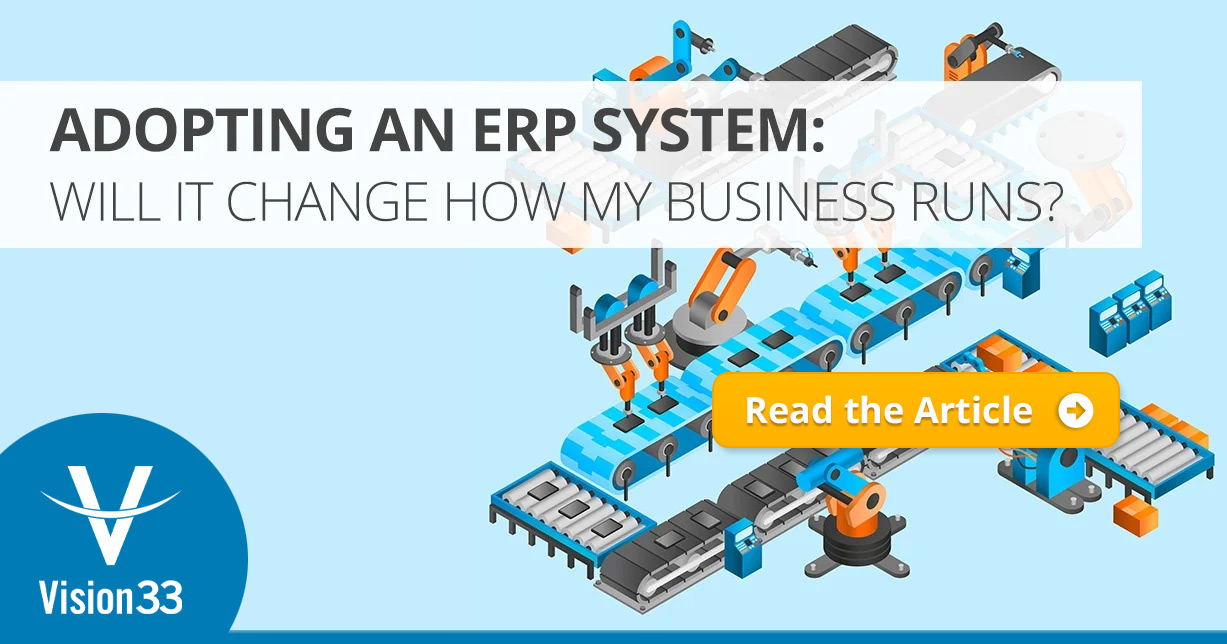ERP Experience Reinvented: SAP Business One Web Client
SAP Business OneSAP Business One Web Client is the foundation of the next generation of SAP Business One: smarter,...

July 03, 2018
Blog > Adopting an ERP System: Will It Change How My Business Runs?
During a Vision33 guest speaker webinar titled SMBs: Think You’re Too Small for ERP? Think Again, a webinar participant asked the question: Does a business management solution like enterprise resource planning (ERP) require a business to change their processes – the very way they do business? To field the question, webinar host Carl B. Lewis of Vision33, along with guest speaker Cindy Jutras of Mint Jutras enterprise research firm, provided some insight into the question. Growing business concerned about disturbing the very formula that led to their success should first consider the real cost of holding onto inefficient processes.
As a business grows and moves into the next stage of business growth, the more the processes and procedures adopted during the start-up phase become ingrained. Although these software, processes, and procedures may have worked in the early days, some of them may or may not be optimal to meet the requirements of the business today. The more these processes become ingrained, the harder it is to change them, and the more expensive it becomes to hold on to old ways of doing things.
Whereas adopting ERP at an earlier stage of growth may come with some change in process, but the benefits outweigh the time it takes for ERP selection. Small to midsized business (SMB) have an advantage over larger companies that delay their move to adopt ERP; less business complexity and less adaption required result in a simpler, less costly ERP implementation.
Working with an ERP partner for implementation and to carry out change management is a viable strategy to ensuring a successful transition to ERP. Growing businesses that instead elect to build customizations or workarounds for their accounting software soon realize the added costs in time, money, and system performance that come with it. The caveat of “doing things the way that we always have” is that a business may lose their flexibility to respond to market opportunities as the system becomes cumbersome, slow, and inefficient.
In the webinar, Jutras shared her recent enterprise research findings, providing examples of some of the benefits of moving to an ERP solution and how within a year of go-live, many survey respondents’ expectations were exceeded. Whereas businesses that hold onto their current procedures and processes, without periodic evaluation, can very well propagate poor practices because of a “that’s how we’ve always done business” mantra. Working backward from a business’ long-term goals is helpful in determining the requirements of a business management system today and tomorrow.
As Jutras puts it, the system that got you where you are today may not support you where you need to go tomorrow. To learn more about why change and ERP can be good for your business access the Vision33 Beginner's Guide to ERP.
For fast-growing businesses, the time to shift from small business accounting software (e.g. QuickBooks) to an ERP platform may already be upon you. But how do you know for sure and where do you begin sorting through your options?
These are challenging and often complicated questions to answer, and in most cases, the available resources online don’t clarify anything. For that reason, we consolidated all our early stage ERP resources in one place.
Subscribe to our newsletter to receive our latest blog posts, case studies and ERP news delivered straight to your inbox.
SAP Business One Web Client is the foundation of the next generation of SAP Business One: smarter,...
Here are 5 reasons SAP Business One is the preferred cloud ERP solution for growing businesses—and...
[Updated] A cloud ERP solution like SAP Business One lets you run your business in ways that are...
Recieve our latest blog posts, case studies, and ERP news
delivered straight to your inbox.